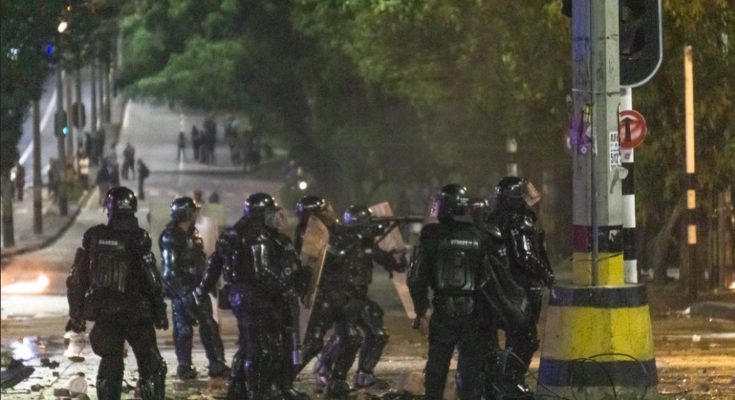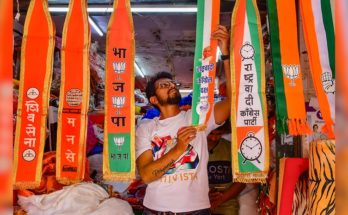-
British military unit also ‘assists’ Colombia’s armed forces, which have killed thousands of civilians and are now deployed to quell protests
-
Colombian military officers attended five courses in Britain last year, among hundreds trained in UK in recent years
The UK military had up to nine soldiers “assisting” the Colombian police force a month before it launched a brutal crackdown on anti-government protesters that left 63 people dead.
But the Ministry of Defence (MOD) refused to reveal the nature of the assistance or tell Declassified if the UK personnel continued assisting the Colombian police throughout the crackdown.
This is the first time the MOD has revealed the existence of its Colombia police programme.
Since late April, protests which began against the government’s proposed tax reform have gripped the South American country, leaving 63 people dead, according to Human Rights Watch.
Amnesty International has reported “police repression of mostly peaceful demonstrations” in different cities across Colombia. It added that “police have used force indiscriminately and disproportionately, and there are alarming reports of sexual violence and disappearances”.
Wendy Morton, foreign minister responsible for the Americas, told Parliament in March, the month before protests erupted: “Fewer than 10 members of the UK armed forces are deployed to Colombia to assist the Colombian police service.”
Last year, the MOD told Declassified in response to a freedom of information request that the UK military had “up to five” personnel deployed in Colombia. However, it refused to say what their role was as it “would prejudice the security of UK personnel serving abroad”.
But after being notified of the Foreign Office admission in March, the MOD told Declassified the “UK Armed Forces have supported a number of Colombian authorities including the Colombian Police.”
Declassified understands the UK military did not assist any Colombian police units that were involved in responding to the recent protests and have not provided training or assistance in public order or crowd control.
Recently, Declassified revealed that the UK’s National Crime Agency (NCA) had also trained the Colombian police in a multimillion-pound five-year programme that is again shrouded in secrecy. The NCA is shielded from Britain’s transparency laws.
Military support
Morton also told Parliament that the UK military personnel deployed in Colombia support the country’s armed forces as well as the police, including “capacity building support” to the Colombian Ministry of Defence.
There has long been close military cooperation between the UK and Colombia, amid the appalling human rights record of the South American country’s armed forces.
A recent inquiry found the Colombian army was responsible for 6,402 extrajudicial killings of civilians from 2002-8 during a crackdown on left-wing rebels in the country.
Vulnerable people, often poor young men, were murdered and falsely presented as enemy combatants in order to improve public perception of the army’s fight against the FARC guerrilla movement and access rewards offered to military units that achieved high body counts.
In May, Colombian President Ivan Duque deployed troops to one of the country’s western provinces and its capital, which was also put under a curfew.
“From tonight begins the maximum deployment of military assistance to the national police in Cali and the province of Valle,” Duque said, referring to the country’s major southwestern city. He added that the military was being used to stop “vandalism, unrest” as well as to protect “strategic assets”.
Protests began against increased taxes, and then to demand measures against corruption, inequality, police brutality and the economic impact of the coronavirus pandemic, which has left more than 40% of Colombians surviving on less than $90 a month.
Last year, Colombian personnel attended five military courses in the UK, including “building integrity for senior leaders”, a course for one- and two-star military officers.
The previous year, six courses were given to Colombian military personnel, including an “advanced command and staff course”, which includes “planning operations”.
At least two Colombian army officers have trained at British military academies. In 2018, a second lieutenant completed a year of training at the army college Sandhurst, and in 2019, a naval officer concluded 11 months of training at Dartmouth naval college.
It is not known if any UK-trained Colombian soldiers are now deployed in Cali.
Freedom of information requests reveal that in the six years to 2020, 309 Colombian students studied at the UK’s Defence Academy and its constituent colleges. The academy is part of the MOD and trains personnel from the British army and civil service, as well as from overseas.
An MOD spokesperson told Declassified: “All defence engagement and training provided to Colombia is designed to educate where necessary on best practice and compliance with International Humanitarian Law.”
They added: “Assessments of the potential impact of providing assistance are updated periodically or whenever there are fresh concerns regarding human rights or compliance with International Humanitarian Law.”
British assistance has also extended to Colombia’s intelligence services. MI6, the UK’s external intelligence agency, “was heavily involved in setting up” so-called “vetted units” of Colombian intelligence agents, according to a 2016 BBC article.
It added: “MI6 also helped Colombia set up electronic eavesdropping centres, recording incriminating conversations”.
In 2018 the Colombian army ran an illegal spying operation on more than 130 people including politicians, NGOs, trade unionists, and international journalists.
A British official recently said: “We share concerns about reports of human rights violations in relation to the protests, and we welcome the Colombian government’s commitment to conduct transparent investigations into all allegations of excessive use of force.”
‘Massive human rights violations’
Since the beginning of 2016, the UK has licenced the export of £28-million worth of military or “dual-use” (military and civilian) equipment to Colombia. This includes £1.5-million worth of light weapons, artillery, small arms, and ammunition.
The UK government claims to refuse arms exports when there is a “risk of contributing to internal tensions or conflict in the recipient country”.
However, it commissioned a report in 2018 that found the Colombian state and military had carried out “massive human rights violations and abuses”, leading to the “systematic contravention of international humanitarian law”.
The following year, the UK government invited Colombia to shop for arms at DSEI, a defence fair dubbed a “festival of violence” that brings together arms dealers and military delegations from around the world.
In 2020, the British government made Colombia one of its key arms sales markets and rubber-stamped all 30 export licence requests made, to the tune of £2.5-million, despite placing it on its “human rights priority countries” in the same year.
In May, in response to pressure from MPs on British arms exports to Colombia, Foreign Minister Wendy Morton defended the policy, claiming the UK government operates “one of the most robust arms export control regimes in the world”.
Morton was previously co-treasurer of the All-Parliamentary Group for the Armed Forces, which receives funding from arms exporters, including weapons giant BAE Systems while Morton was in her role.
BAE enjoys a “close relationship” with Colombia and has sold the government artillery, unmanned aerial vehicles, radar systems and cannons. It also attended an arms fair in Bogotá in 2019.
Hasan Dodwell, director of London-based NGO Justice for Colombia, told Declassified: “Throughout the long bloody history of human rights abuses in Colombia, Britain has been a close military ally. While the Colombian police continue to kill protesters in the cities and the Army kills protesters in the countryside, this partnership continues.”
Dodwell added: “Rather than offering training and providing weaponry, the British government should be using its influence to condemn the violence of Colombian security forces and demand full respect for the right to protest and an end to human rights violations.”
The UK Foreign Office did not respond to a request for comment.
(Matt Kennard is head of Investigations at Declassified UK, an investigative journalism organisation that covers the UK’s role in the world. Molly Antigone Hall is an investigative journalist based in Barcelona, Spain who has written for La Vanguardia.)
Photo: Oxi.Ap / Flickr




